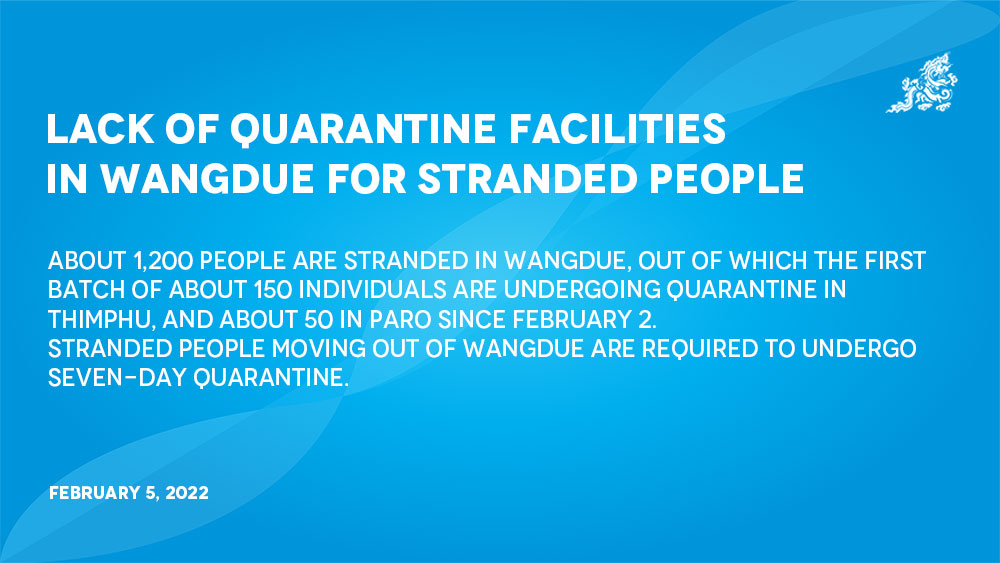Yangyel Lhaden
About 1,200 people are stranded in Wangdue, out of which the first batch of about 150 individuals are undergoing quarantine in Thimphu, and about 50 in Paro since February 2.
Stranded people moving out of Wangdue are required to undergo seven-day quarantine.
Individuals quarantined are bound to travel to their homes in west and south of the country.
Paro has arranged quarantine for people in the dzongkhag.
The hotline number of Wangdue, 1197, is busy attending to never-ending calls from frustrated stranded people.
A teacher, Purni Maya Mongar in Trongsa, came to Wangdue for vacation before the lockdown. She said that there were coordination issues in the dzongkhag. “I called 1197 to enquire about moving to Trongsa and I have been directed to so many officials. Some talked rudely while other officials rejected and then switched off their phones.”
Twelve family members from Paro and Thimphu went to attend a funeral in Wangdue. They are quarantined in Thimphu and Paro. A family member said it was tough to move out of Wangdue and they registered one week after the lockdown as they had some issues within the family.
“Once registration is completed. There is no follow up from the official and we are kept waiting.”
He said that he called the task force members and nobody had a solid answer and there were no clear directives. “We have to call repeatedly.”
An officiating principal in a primary school of Mongar, Jigme Dorji, said that he filled three forms and was hesitant to call officials repeatedly.
Jigme Dorji said that he had to report to school by February 15 and there were a lot of pending works to complete before school opening.
The Ministry of Education notified yesterday the rescheduled reporting date of primary and lower secondary school students on March 1 and teachers of primary and lower secondary schools on February 15.
It also stated schools to consider those teachers and staff stranded in other dzongkhags and thromdes not able to report on time due to recent surge in Covid-19.
One of the stranded persons said that since there were many formalities to complete while some even required sending electronic mails, he wondered how illiterate people would fill those forms.
Wangdue Dzongdag, Sonam Jamtsho, said the main issue of not being able to send stranded people out of Wangdue is lack of quarantine facilities with the dzongkhag. “With high case burden we are turning every structure in Wangdue into an isolation facility.”
He said that for emergency cases of stranded people at the best we could turn two hotels into quarantine facilities. “ We have been able to send first batch of stranded people because we received support from Paro Dzongkhag Administration and Cabinet Secretary in Thimphu.”
Sonam Jamtsho said that we had not been able to send stranded people in East so far but we have now identified quarantine hotels in Gangtey and Phobjikha. “We have also requested Trongsa dzongkhag to arrange quarantine facility for people coming to Trongsa. In next two days we will be able to send stranded people to East and another batch to Paro and Thimphu.”
He said that it took time for system to establish and work efficiently. “To cater to stranded people we need support from other dzongkhags but we need to look into other dzongkhags situation as we have not been able to send people to Tsirang and Gelephu. We planned for a quarantine facility in Tsirang but Tsirang is facing high case burden themselves.”
“Our priority is to not let the virus spread out of Wangdue; and we also screen cases to verify whether the person is stranded,” he added.
Essential services have improved in Wangdue. In the initial days of lockdown, people complained of not receiving essential commodities even after five days of placing the order.
Kuengaa Dorji, a businessman in Bajo, said that he received essential items within 24 hours of placing the orders. “Though we are not able to get what we ordered and sometimes there is a mistake we are thankful as we do not expect much during these challenging times.”
He said that in the beginning he saw many people complaining about slow delivery in group chats.
Bala Ram Ramdam, a daily wage worker, said that he received monetary support from Royal Kidu and was able to buy essential items and was happy with the service.
Kiney Wangmo lives in a “red” building and she said that she had to call Gojay when she was not able to receive essential items even after five days of placing the orders. “Though services are enhanced now, they can do better in delivering the items we ordered or at the least officials could inform us what items were not available.”
She said that she had to order multiple times to receive everything.
Sonam Jamtsho said that as Wangdue was not a bordering town he did not expect disaster of this magnitude and was moderately prepared like any other dzongkhag. “With support from relevant stakeholders we have now been able to cater essential services smoothly.”


